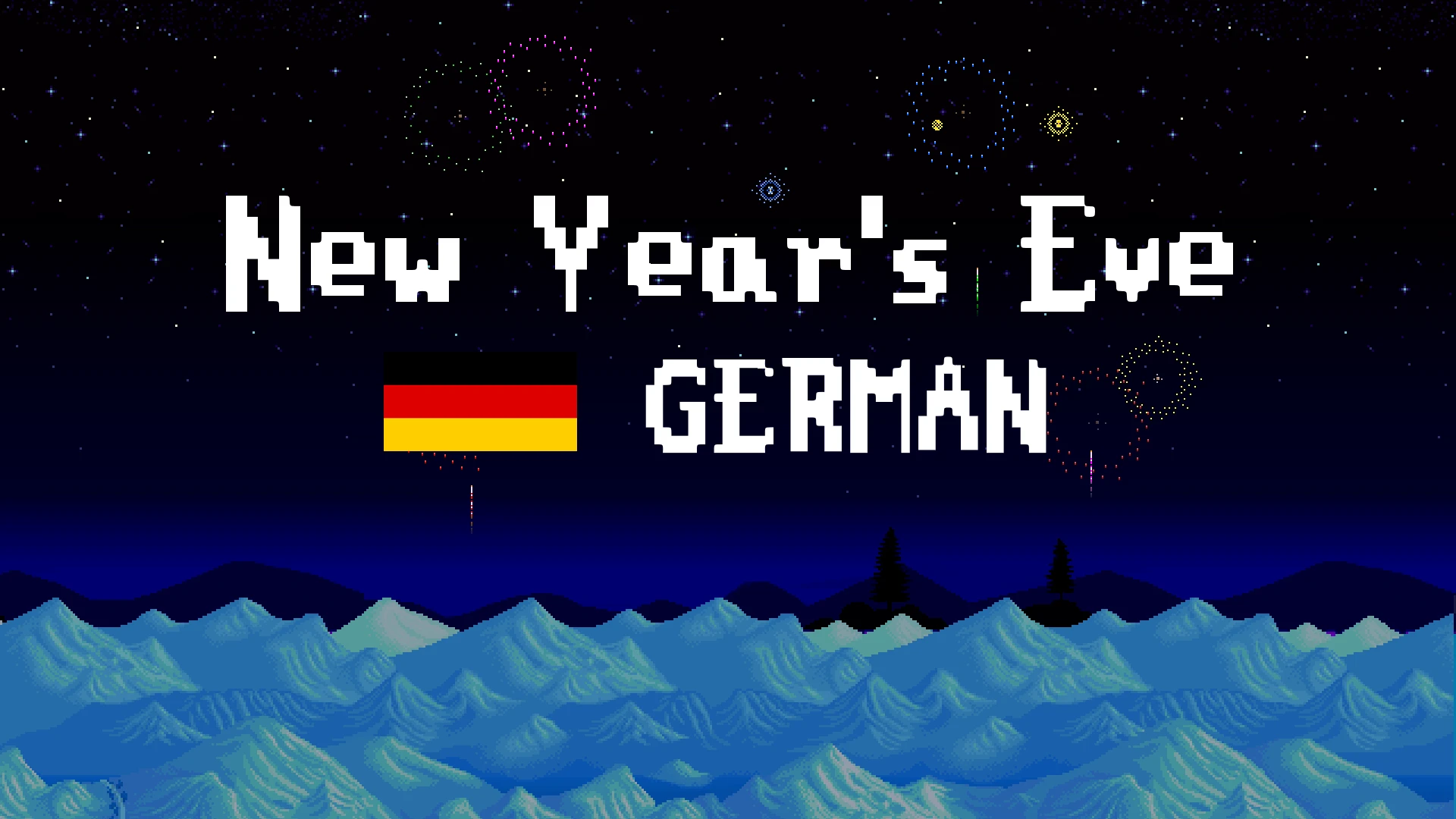Gallery
Photos from events, contest for the best costume, videos from master classes.










New Year’s Eve in German is “ Silvester,” but there is no way to say “Happy New Year's Eve” in German. You wouldn’t wish a happy “Silvester,” only a happy new year: Frohes neues Jahr [ˌfʁoːəs ˌnɔɪ̯əs ˈjaːɐ̯]. “ Frohes ” is pronounced just like you would read it, only with the specific German “r.” Learn how to wish someone a happy new year in German-speaking country and learn more greetings along with new year's traditions! In Germany, it is customary to greet friends and family with a specific phrase on New Year’s Eve and New Year’s Day. The most common New Year’s greeting in German is “Frohes Neues Jahr!”, which translates to “Happy New Year!” in English. Here are some common informal ways to say it in German: “Frohes neues!” – This is a shortened and more casual version of “Frohes neues Jahr!” It’s commonly used among friends and peers. “Guten Rutsch!” – This is a popular informal expression in Germany, especially on New Year’s Eve. To learn about German New Year's Eve, start with the word "Silvester." This is how Germans say "New Year's Eve." Knowing this helps you understand more German terms related to this celebration. "Das neue Jahr" is a German phrase that translates to "the new year" in English. Here are some answers to common questions that will give you more insight into German New Year's customs and what to expect during the festivities. 1. Do Germans Make New Year's Resolutions? Yes, many Germans make New Year's resolutions, just like in other countries. Common resolutions include getting fit, spending more time with family, or New Year’s Eve, or Silvester, is a festive and exciting time in Germany, filled with fireworks, parties, and traditions that ring in the New Year with style. Whether you’re planning to join in the local celebrations or want to understand what’s happening around you, knowing some essential German words and phrases can enhance your experience. Here’s a guide to help you navigate New Year Well, let’s explore how different German-speaking countries celebrate New Year’s Eve. Important New Year’s Phrases In German To Know. New Year’s Eve (Silvester)* New Year’s Day (Neujahr) Happy New Year (ein frohes neues jahr) A Happy New Year (ein glückliches neues jahr) *In Germany, Silvester is the German name for the last day of New Year’s Eve, or Silvester in German, is celebrated with various customs, including fireworks, parties, and toasts. Below are dialogues and phrases you can use to engage in conversation during this festive time. Dialogue 1: Greeting Friends on New Year’s Eve. You: Hallo! Hast du schon Pläne für Silvester?** (Hi! So, how do you say Happy New Year in German? Let a native teach you! At GermanPod101, you will learn how to correctly greet your friends over New Year, and wish them well with these German New Year wishes! Table of Contents. How to Celebrate New Year in Germany; Must-Know German Words & Phrases for the New Year! Top 10 New Year’s Resolutions New Year's Eve Customs in Austria, Germany, Switzerland Prosit Neujahr! • Happy New Year! Celebrating the New Year! The following practices and traditions are associated with the beginning of the new year in German-speaking countries: Berliner Pfannkuchen (jelly-filled doughnuts) Although they are generally available year-round, German bakeries bake up extra amounts of Berliner Pfannkuchen for “How would you say” I’ll give you always a few seconds for your take.) Here are some of the sample sentences I go through in the podcast: Wo feierst du Silvester? (Where celebrate you New Year’s Eve?) Where are you going to celebrate New Year’s Eve? Ich feiere Silvester zu Hause. (I celebrate New Year’s Eve at home.) A somewhat strange yet widely used new year’s greeting in German is Einen Guten Rutsch or simply Guten Rutsch. It means a “good slide” or a wish for a smooth start or transition into the new year. Of course, the new year comes with new hope and new aspirations. New Year’s Eve Traditions in Germany. New Year’s Eve is a night of celebration and merriment in Germany. One of the most important traditions is the fireworks display. Germans love to set off fireworks at midnight to welcome the New Year with a bang. Less formal is Guten Rutsch which literally means to slide or glide into the new year well. Another way to say this is Komm gut rüber (get well to the other side (of the year)). Prosit Neujahr comes from the Latin word prodesse and means “may the new year be good to you”. How to pronounce new year's eve in German? This app is a free online pronunciation app. Use it to listen to how new year's eve ("Silvester") is pronounced in German and in the world's most widespread languages. 6. Christmas Eve (Heiligabend) Speaking of Christmas Eve, this is when the magic really happens. It’s the main event in Germany—families come together for a cozy evening of food, church services, and gift-giving, or Bescherung as they call it. 7. New Year’s Eve (Silvester) Okay, technically, this isn’t Christmas, but it’s too fun to A Berliner is simply just a jelly-filled doughnut covered in sugar that Germans flock to bakeries for on New Year’s Eve. However, the Berliner is also called Krapfen in West and Southern Germany and Pfannkuchen in Berlin and other surrounding areas. Some Germans eat them at midnight on New Year’s Eve while others save them until New Year Learn how to say New Year's Eve in German, how to say it in real life and how you can use Memrise to learn other real German phrases. „Guten Rutsch“ oder „happy new year“? In Germany it is just as common to wish each other "Happy New Year" or a "good slide into the new Year". Wir wünschen einen guten Rutsch ins neue Jahr. (We wish you a happy new year (good slide).) Ich wünsche ein frohes neues Jahr. (I wish you a happy new year.) das Feuerwerk (the firework) Mehr
Articles and news, personal stories, interviews with experts.
Photos from events, contest for the best costume, videos from master classes.









